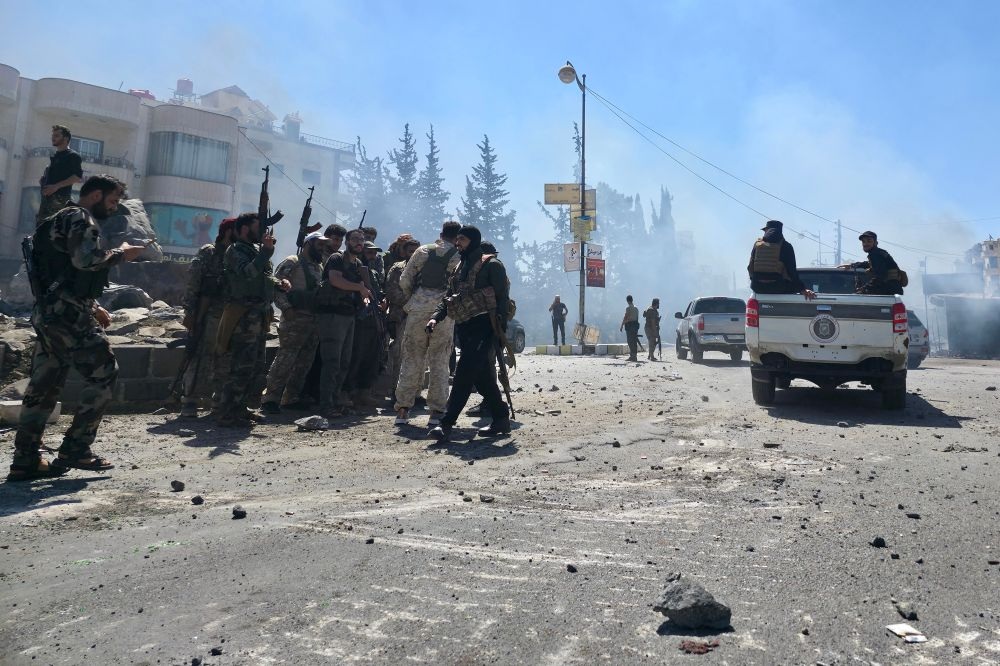After four days of violent clashes, Syrian government forces have withdrawn from the Druze-majority province of Sweida, bringing a temporary halt to fighting between the army and local Druze militias.
The withdrawal marks a rare concession by Damascus and comes as part of an effort to avoid wider conflict in a region already scarred by years of war.
Syrian President Ahmed al-Sharaa announced the decision in a speech on Thursday, stating that Druze groups would now take charge of local security.
“We sought to avoid dragging the country into a new, broader war that could derail it from its path to recovery,” Sharaa said.
She framed the withdrawal as a move prioritizing national stability over further bloodshed.
However, the uneasy calm was short-lived.
By Thursday afternoon, reports emerged of renewed violence, as Druze fighters allegedly launched retaliatory attacks on nearby Bedouin villages.
Syrian state media and local outlets reported homes being burned and civilians displaced in response to earlier fighting, during which some Bedouin tribes had supported government forces.
The Syrian outlet Enab Baladi quoted Bedouin residents saying that “armed groups of Druze” stormed their communities, sparking fears of an escalating sectarian conflict.
In an attempt to de-escalate, Druze spiritual leader Sheikh Hikmat al-Hijri released a statement promising to respect peaceful Bedouin clans and avoid collective punishment.
The conflict began on Monday, when a local dispute between Druze fighters and Bedouin tribes spiraled into full-scale violence.
Syrian security forces attempted to intervene but were met with resistance from local Druze militias, leading to days of heavy clashes.
In a dramatic turn, Israel launched airstrikes targeting the Syrian Ministry of Defense in Damascus and dozens of military positions in southern Syria.
The Israeli military said the attacks were intended as a direct message to the Syrian president in response to the unrest in Sweida.
The strikes marked Israel’s first major military engagement in Syria in months, raising regional tensions significantly.
According to the UK-based Syrian Observatory for Human Rights, at least 516 people were killed during the week’s fighting.
Of those, 86 were civilians reportedly killed by government forces, while three Bedouin civilians were said to have been killed by Druze fighters in Thursday’s revenge attacks.
President Sharaa condemned the Israeli strikes, accusing them of targeting both civilian and military infrastructure and warning of a potential escalation.
He credited American, Arab, and Turkish diplomatic efforts with averting a broader regional conflict.
These clashes represent one of the most serious challenges to the Syrian government’s authority in recent months.
The last comparable crisis occurred in March, when 1,500 mostly Alawite civilians were killed in the northwest during a failed offensive by remnants of the ousted Assad regime.
Sweida, home to Syria’s Druze minority, has long been pushing for autonomy from Damascus.
Since the fall of the Assad regime, Druze leaders have attempted to negotiate their community’s role within a restructured Syrian state.
However, those talks have yet to yield a clear resolution, and the recent violence has deepened mistrust.
Many Druze residents expressed disillusionment after the clashes.
“I would rather die than be ruled by them.
“At least I would die with dignity,” said a 25-year-old civil engineer from Sweida who lost two cousins in the fighting.
Yet not all voices within the Druze community are aligned. Youssef Jarboua, another key Druze spiritual leader, has called for a more conciliatory approach and continued dialogue with Damascus.
Sharaa acknowledged civilian casualties and pledged that any perpetrators of crimes against the Druze would be held accountable.
“They are under the protection and responsibility of the state,” he said.
In Washington, U.S. Secretary of State Marco Rubio welcomed the ceasefire, urging all sides to uphold their commitments.
Rubio blamed long-standing rivalries for sparking the violence and revealed that U.S. diplomats were working behind the scenes to prevent further Israeli strikes.
The unrest has also affected Israeli-Druze relations.
Dozens of Israeli Druze crossed the border into Syria on Wednesday in protest.
Israeli Prime Minister Benjamin Netanyahu urged restraint and promised support for the Druze, while the military said it was working to ensure the safe return of those who crossed.
While the Syrian army’s withdrawal marks a temporary pause in the fighting, questions remain over Sweida’s future status.
The president’s statement made no mention of the continued presence of Syria’s general security forces, leaving the extent of true autonomy in doubt.
Diplomatic sources confirmed that the UN Security Council would convene Thursday to discuss the crisis, as both local and international actors seek to prevent the violence from spiraling into a wider conflict.



